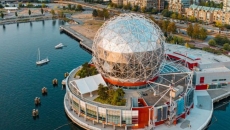The calculus of predicting an election and identifying its key battlegrounds is complex enough in any race, but observers of the British Columbia poll this month are facing a pair of unknown quantities that make the maths even more confounding.
Those are the significant redistribution that has added six ridings to the electoral map, and the collapse of the Opposition BC United party, formerly the BC Liberals, coupled with the rise of the upstart B.C. Conservatives as the NDP's main challenger.
Kennedy Stewart, Vancouver's former mayor who also sat in Parliament in Ottawa for the NDP from 2011 to 2018, said those factors make the Oct. 19 election tough to call.
"Ordinarily, in a race where it has familiar parties with familiar ridings, familiar boundaries, it's a lot easier to predict what's going to happen," said Stewart.
"But those two main things — the boundary changes and the total upheaval on the centre-right — make this a very difficult election to predict."
Mike McDonald was chief of staff for BC Liberal premier Christy Clark and is co-host of the Hotel Pacifico podcast on the province's political scene. He said there are "always a few ridings that surprise you" but this year's realignment of both ridings and parties adds even more volatility.
Even so, both McDonald and Stewart say some areas will face scrutiny for their ability to turn the race. These include seats that swung into NDP hands in 2020 on the back of a 14 per cent gap with the Liberals in the overall popular vote.
McDonald said a gap that wide created a "wave" pushing the NDP over the finish line in ridings that are not traditionally left-leaning, including districts in Fraser Valley communities such as Langley, Abbotsford and Chilliwack.
The NDP took five of seven ridings in those communities in 2020.
"In this election, the public polls are telling us it's going to be much tighter, at least so far," McDonald said of the popular vote. "And so, if we were single-digit margin on the popular vote provincewide — say, less than five per cent difference — then you're going to see a lot of those NDP seats that were won in 2020 fall by the wayside."
The question then turns to how far such a Conservative wave in the Fraser Valley might push into Metro Vancouver, McDonald said.
He pointed to the importance of Langley-Willowbrook, which includes the city of Langley, as a riding that had seen a trend of younger families moving in from bigger communities in the Lower Mainland.
"That riding is in question," he said. "It's gone federal Liberal in some recent elections, and it went NDP last time, of course. So a riding like Langley-Willowbrook might be where the NDP start to push back and resist the Conservative momentum."
Stewart said attention should also be on deep urban ridings, historically places where the NDP has done well against centre-right parties.
He said that trend may not hold given what he described as the NDP's shift toward the centre on issues such as the carbon tax and involuntary care for drug users and the mentally ill. Such policies could be designed to fend off the right but may lower voter enthusiasm among the NDP's base, he said.
"I think that all adds up to say that even in traditional areas that would be safe for the NDP like Vancouver, you're going to see some ridings that would be in play for the Conservatives that may not have been in play in the past," Stewart said.
"So for example, areas like Vancouver-Little Mountain that's had a significant boundary change, you may see that being a tighter race than you would normally see. You would see Langara, even (NDP Leader David Eby's) own riding of Point Grey, which has gone back and forth between the centre-right and the NDP, probably in play as well."
Stewart said he was also looking at ridings where the BC Green Party has traditionally been strong, watching how the NDP's shift to the centre especially on issues such as the carbon tax would play out.
He noted the Greens face challenges as leader Sonia Furstenau switches ridings to face NDP cabinet member Grace Lore in Victoria-Beacon Hill.
Her deputy, Adam Olsen, has decided against running in Saanich North and the Islands, leaving no incumbent Greens defending their seats.
"I thought this wasn't going to be great for the Greens," Stewart said. "However, with the NDP kind of shifting to the right … I think it really does open an opportunity for the Greens to pick up disaffected NDP voters."
McDonald said the Greens' best shot at retaining a seat at the legislature may be West Vancouver-Sea to Sky, where their candidate Jeremy Valeriote lost to the BC Liberals' Jordan Sturdy by 60 votes in 2020.
Valeriote returns to contest the riding but Sturdy isn't running. Instead, Valeriote faces two other high-profile candidates — Order of B.C. recipient Yuri Fulmer for the Conservatives and former Union of BC Municipalities president Jen Ford for the NDP.
"That region has changed a lot," McDonald said. "The Sea-to-Sky corridor is a bigger part of the population there (in the riding) than the West Vancouver part, so that one will be very unpredictable and I think that will definitely be one to watch."
McDonald said he also foresees fierce competitions in traditional battlegrounds in Maple Ridge, Coquitlam-Burke Mountain, Courtenay-Comox and Skeena, as well as communities with demographic changes such as Surrey and Richmond.
He isn't optimistic for the group of former BC United incumbents now running as Independents against Conservatives in traditionally centre-right settings.
"I think where the independent candidates will make the biggest impact are in ridings where the NDP have a chance of winning, and a strong Independent may dilute the Conservative vote and help elect an NDP MLA," McDonald said, citing Vernon-Lumby as an example.
There, Lumby mayor and former BC United candidate Kevin Acton is running as an Independent against incumbent NDP candidate Harwinder Sandhu and the Conservatives' Dennis Giesbrecht.
Incumbents running as Independents, such as Mike Bernier in Peace River South, Dan Davies in Peace River North, Tom Shypitka in Kootenay-Rockies, Coralee Oakes in Prince George-North Cariboo and Karin Kirkpatrick in West Vancouver-Capilano, will find re-election tough, said McDonald.
"In British Columbia's history, it's very hard for an Independent to win an election. It's only happened a handful of times," he said
But a strong candidate and local campaigning matter too, when margins between parties are slim.
"It's winning the little local-issue battles, riding by riding. In 2017, that one riding, Courtenay-Comox, decided the fate of who governs B.C.," he said, referring to the narrow win by the NDP's Ronna-Rae Leonard that ultimately helped the NDP's John Horgan become premier.
"So many things could have happened differently in that election to turn that riding the other way.
"That's a good thing about elections. They should be unpredictable to some degree, because it's up to voters decide at the end of the day."






